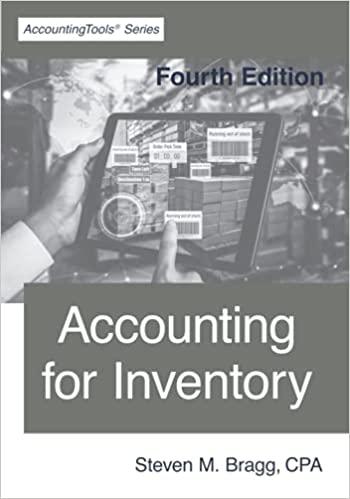Answered step by step
Verified Expert Solution
Question
1 Approved Answer
On January 1, 2018, the general ledger of TNT Fireworks includes the following account balances: Accounts Debit Credit Cash $ 60,300 Accounts Receivable 28,200 Allowance
On January 1, 2018, the general ledger of TNT Fireworks includes the following account balances:
| Accounts | Debit | Credit | ||||
| Cash | $ | 60,300 | ||||
| Accounts Receivable | 28,200 | |||||
| Allowance for Uncollectible Accounts | $ | 3,800 | ||||
| Inventory | 37,900 | |||||
| Notes Receivable (5%, due in 2 years) | 31,200 | |||||
| Land | 171,000 | |||||
| Accounts Payable | 16,400 | |||||
| Common Stock | 236,000 | |||||
| Retained Earnings | 72,400 | |||||
| Totals | $ | 328,600 | $ | 328,600 | ||
During January 2018, the following transactions occur:
| January | 1 | Purchase equipment for $21,100. The company estimates a residual value of $3,100 and a five-year service life. | ||
| January | 4 | Pay cash on accounts payable, $11,100. | ||
| January | 8 | Purchase additional inventory on account, $98,900. | ||
| January | 15 | Receive cash on accounts receivable, $23,600 | ||
| January | 19 | Pay cash for salaries, $31,400. | ||
| January | 28 | Pay cash for January utilities, $18,100. | ||
| January | 30 | Firework sales for January total $236,000. All of these sales are on account. The cost of the units sold is $123,000. |
The following information is available on January 31, 2018.
- Depreciation on the equipment for the month of January is calculated using the straight-line method. At the time the equipment was purchased, the company estimated a residual value of $3,000 and a two-year service life.
- At the end of January, $4,600 of accounts receivable are past due, and the company estimates that 50% of these accounts will not be collected. Of the remaining accounts receivable, the company estimates that 3% will not be collected. The note receivable of $31,200 is considered fully collectible and therefore is not included in the estimate of uncollectible accounts.
- Accrued interest revenue on notes receivable for January.
- Unpaid salaries at the end of January are $34,200.
- Accrued income taxes at the end of January are $10,600.
- Requirement
- General Journal
- General Ledger
- Trial Balance
- Income Statement
- Balance Sheet
- Analysis
-
1.
Record each of the transactions listed above in the 'General Journal' tab (these are shown as items 1 - 8) assuming a FIFO perpetual inventory system. The transaction on January 30 requires two entries: one to record sales revenue and one to record cost of goods sold. Review the 'General Ledger' and the 'Trial Balance' tabs to see the effect of the transactions on the account balances. 2. Record adjusting entries on January 31. in the 'General Journal' tab (these are shown as items 9-13). 3. Review the adjusted 'Trial Balance' as of January 31, 2018, in the 'Trial Balance' tab. 4. Prepare a multiple-step income statement for the period ended January 31, 2018, in the 'Income Statement' tab. 5. Prepare a classified balance sheet as of January 31, 2018, in the 'Balance Sheet' tab. 6. Record the closing entries in the 'General Journal' tab (these are shown as items 14-16). 7. Using the information from the requirements above, complete the 'Analysis' tab.
Using the information from the requirements above, complete the 'Analysis'. (Round final answers to one decimal place.)
| |||||||||||||||||||||||||||||||||||||||||||||||||||||||
rev: 12_07_2017_QC_CS-111691
Step by Step Solution
There are 3 Steps involved in it
Step: 1

Get Instant Access to Expert-Tailored Solutions
See step-by-step solutions with expert insights and AI powered tools for academic success
Step: 2

Step: 3

Ace Your Homework with AI
Get the answers you need in no time with our AI-driven, step-by-step assistance
Get Started


